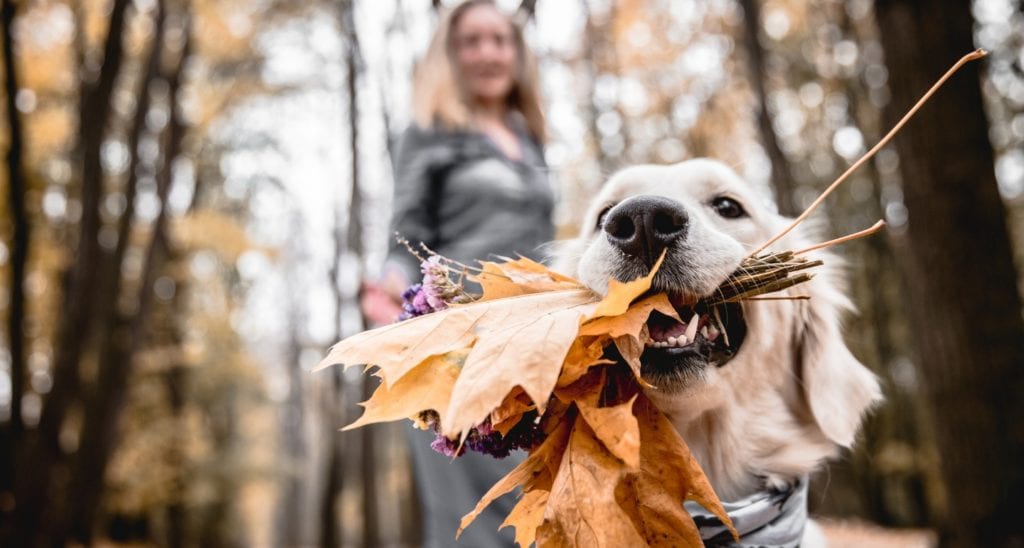Fall Safety Tips for Pets

Photo by cipella/iStock / Getty Images Plus
Along with cooler weather and shorter days, the fall season means a higher risk of your pet being exposed to toxic plants for dogs and cats alike. Keeping your fur baby healthy this autumn means being on the lookout for nuts, mushrooms, seasonal flowers and other items that may cause injury or intestinal distress. Follow these fall safety tips for pets to keep the whole family safe.
Indoors
Rodenticide
When the temperatures drop, little critters like mice and rats try to sneak into warm homes. But be careful how you choose to deal with this issue, because rat poison and dogs (or cats, for that matter) don’t mix. “Rat poison is serious—and potentially fatal,” warns Dr. Ann Hohenhaus, DVM, staff doctor at New York City’s Animal Medical Center. There are two main types: ones that stop the blood from clotting and those that increase blood calcium to a dangerous level, she explains. If your cat or dog eats rat poison, you should take them to your veterinarian immediately for emergency medical care.
School Supplies
Some dogs just can’t resist rooting around in a kid’s backpack, especially if there was a turkey sandwich in it the day before. But luckily for your pet, school supplies are relatively harmless these days, says Dr. Liff. “Most of these products are safe for children if ingested, so they shouldn’t be a big problem if your dog tries them,” she explains. Batteries, however, are another story. “From time to time we see a pet who’s eaten these, and sometimes it can be toxic to the animal or can cause obstruction,” she adds. Also be careful with tiny caps, notes Dr. Hohenhaus. “Marker caps are just the right size to get caught in the intestine if swallowed,” she notes. “And cats adore rubber bands and may ingest them, which can cause an intestinal blockage.”
Holiday Treats
October brings a bunch of trick-or-treating superheroes, goblins, and Frozen Elsa’s to your front door. It also brings a ton of chocolate into your house. Most dog owners know to keep chocolate away from their dogs, but if your pup gets his paws on those sweets, bring them to the vet right away to induce vomiting. Too much chocolate can be toxic.
“You’ll want to keep your Thanksgiving leftovers to yourself, too,” says Anderson. Onions, grapes, and raisins can be toxic to dogs, and “turkey skin is very fatty and can lead to pancreatitis in your pet,” she explains. Many other Thanksgiving foods can also be dangerous for dogs. Dr. Donato warns that feeding Thanksgiving table scraps causes gastroenteritis issues in dogs. “I know it’s a way for people to bond with their pets, but it’s a big reason why we’re kept busy.”
In other words, more leftovers for you.
Outdoors

iStock.com/Harbucks
Plants and Trees
You may think a few dried-up leaves are harmless enough, but they shouldn’t be sampled by your pet. “Leaves can lead to gastrointestinal upset if they’re ingested,” points out Dr. Liff. It’s also a good idea to become familiar with trees and plants poisonous to cats and dogs—like the yew and conifer trees with red berries. “Yews are a cardiac toxin if eaten by pets, causing arrhythmias or potentially cardiac arrest,” she adds.
Mushrooms
While most of the fungus that sprouts up in the woods and on lawns in fall is relatively harmless, it’s best to take caution. “Wild mushrooms can be toxic if ingested by a cat or dog, causing vomiting and sometimes liver injury,” says Dr. Stephanie Liff, DVM, a veterinarian and owner of Pure Paws Veterinary Clinic in New York City.
Flowers
Not many flowers bloom in cooler weather, but there are a few to watch out for. “Autumn crocus is a fall flower that causes destruction of rapidly dividing cells, which can in turn lead to weakness, vomiting, diarrhea, and less frequently, death,” reports Dr. Liff. And lilies are extremely toxic to cats’ kidneys, she adds. Check out our guide to poisonous plants for dogs and the American Society for the Prevention of Cruelty to Animal’s (ASPCA) list of toxic plants for dogs and cats for more insight.
Ticks
“You might only think of ticks as a danger during the summer, but they can pose a big problem to your dog in the fall, too,” Dr. Donato explains. That’s because many animals limit their times outdoors or hibernate when the temps start to drop. The result: fewer victims for ticks to bite. If your dog hangs out in the backyard or goes on walks near woods, he’s an easy target for ticks.
“Ticks have heat sensors and can detect heat up to 30 feet away,” Dr. Donato says. “They can hang out on a branch or tall grass, and then latch onto the creature when he walks by.” Your dog can contract Lyme disease or other nasty infections from a tick after only 24 hours of the bug attaching.
“If a tick does attach to your pet, remove it immediately,” says Anderson. First, wipe the bite site and a pair of fine-point tweezers with rubbing alcohol. (Regular tweezers may squeeze germs from the tick’s body into your pet’s body.) Then grab the tick as close to your dog’s skin as possible, and pull slowly upward with constant pressure until the tick pops out. “Clean the area again with rubbing alcohol,” she adds.
If there’s a bit of the tick still in the skin, don’t worry—it’ll eventually work itself out. But you may want to drop the tick in a small bottle full of alcohol and then take a photo of it on your phone. “That way you can show your vet if he or she needs to identify it later on,” Anderson recommends, adding, “Keep an eye on your dog’s health for the next two weeks.”
Still don’t want to attempt remove the bug yourself? No problem. Just call your vet!
Nuts
Think nuts are healthy for dogs and cats? The ones that end up on the ground this fall aren’t the kinds of treats you should let your pet gnaw or chew on. Black walnuts can be poisonous and lead to seizures and tremors if eaten by pets, notes Dr. Liff. And they often grow mold once they drop, which is another toxic danger. “Acorns can cause intestinal distress, and in small dogs, the GI tract may become obstructed, which might require surgery to remove them,” she says.
Closed Pools
If you’re a pool owner, chances are you’ve already covered your pool for the winter. “Even though the pool is closed up, you still need to keep your pooch away from it,” says Dr. Donato.
The reason? Water can collect in puddles on top of solid covers. If your dog slides out on the cover, he may have trouble getting back to solid ground. “He can get stranded, and quickly get hypothermia if temperatures are low enough,” says Dr. Donato.
This can also occur with mesh covers and if the water isn’t low enough, your pet can walk across and get wet.
Antifreeze
Most car owners check antifreeze levels when winter approaches, but you must use caution around this liquid and pets. “It’s toxic—and it’s rather common for suburban pets to try a taste because of its sweet flavor,” explains Dr. Liff. Your cat or dog may mistakenly lick it off the driveway or garage floor, which can lead to kidney failure and death, though owners usually first report it as vomiting and lethargy. “Antifreeze causes neurologic symptoms, including increased drinking, and ultimately, kidney failure,” adds Dr. Hohenhaus.
If your pet comes into contact with any of these hazards, contact your veterinarian or the ASPCA Animal Poison Control Center at (888) 426-4435 as soon as possible.
Winter brings its own safety hazards for pets, too, so stay vigilant all year long.











